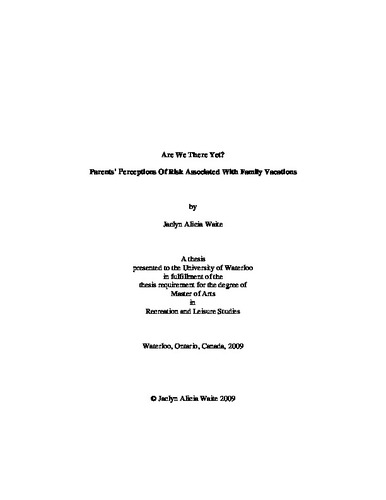| dc.description.abstract | The study explored risk perceptions and novelty dimensions associated with family vacations. In particular, the study focused on households containing married or common law partners, blended families, single parents and same-sex partners, with at least one child aged twelve years old or younger, located in one of the Region of Waterloo’s three cities, encompassing Kitchener, Waterloo, and Cambridge, Ontario. The research explored whether novelty or familiarity of a vacation destination affected the level of risk perceived as well as the locus of control. Additionally the research focused on particular aspects of the family vacation including the decision making process and the stage of the family life cycle in which respondents are categorized, having either younger or older children, affected the decision making process. Lastly, the study looked at external sources of information including family and/or friends, other sources of information, prior experience at the destination, if applicable, and the distance traveled, borders crossed and transportation utilized.
Families in each specified area were initially accessed through five direct contacts and an associated snowball sampling method. A revised data collection method was utilized part way through the study being distribution at a recreation centre within the Region. Respondents were asked to complete a self-administered questionnaire containing questions relating to their last family vacation, preferences for novelty/familiarity, locus of control orientation, degree of risk perception agreement or disagreement and basic sociodemographic characteristics.
Data were reduced to minimize complexity through a series of factor analyses through the use of components analysis. It involved taking salient items and factoring them together based on the conceptual fit within each loading having eight components created. T-tests and analyses of variance were utilized to further univariate relationships between variables of interest. Relationships between perceived risk, gender and prior experience were non-significant (p > .05) whereas family life cycle, level of education, crossing an international border, and total distance traveled had a significant effect on risk perceptions (p < .05) and were included in stepwise regression analyses.
The present study complemented emerging literature suggesting that parents with older children attributing greater risks as associated with creating memories. There was less support for extant research indicating that families with younger children are more likely to associate as many risks with travel. Similarly, preference for novelty/familiarity was found to not have a significant effect on respondents’ risk perceptions yet certain external sources of information (e.g., friends/family, travel agents) played a large role in the level of risk perceptions. | en |

